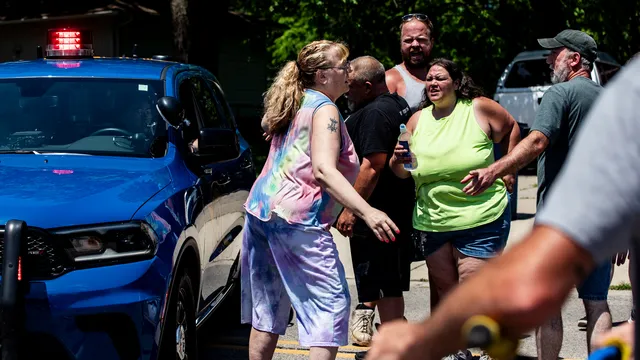
Security guard halts mass shooting at Michigan church
2025-06-24 18:26- A shooter opened fire outside a church in Wayne, Michigan, while church services were taking place.
- Church staff and security team members intervened, significantly preventing a larger tragedy.
- The incident highlights the importance of preparedness in preventing mass shootings in places of worship.
Express your sentiment!
Insights
On a Sunday morning in June 2025, an armed individual attempted to attack CrossPointe Community Church in Wayne, Michigan. The gunman, identified as Brian Anthony Browning, exited his Nissan truck wearing a tactical vest and was armed with an AR-15 rifle and a semi-automatic handgun. He approached the church while firing his weapon. Fortunately, church staff, including a deacon, acted swiftly to prevent a mass shooting. A deacon hit the gunman with his vehicle, slowing his advance. A security guard returned fire and killed Browning during the confrontation, effectively averting a potential tragedy as about 150 worshippers were present during the service. The suspect had shown signs of mental distress and had limited prior contact with the church, where his mother was a member. His motives remain unclear, and authorities are investigating the incident while emphasizing the importance of preparedness and timely intervention in emergency situations. The rapid response by the church's security team and staff likely saved numerous lives on that day. Local law enforcement and the FBI continue to investigate, confirming that there were no explosives found at the scene despite an earlier bomb threat assessment.
Contexts
The mental health impact on gun violence incidents is a complex and multifaceted issue that merits thorough analysis. Increasingly, research indicates that individuals with untreated mental health disorders are overrepresented among those who commit gun violence. Various studies have shown that mental illnesses such as schizophrenia, bipolar disorder, and severe depression can contribute to an individual's risk of engaging in violent behaviors, including the use of firearms. However, it is critical to note that most individuals suffering from mental health issues are not violent, and the vast majority of gun violence is perpetrated by individuals without diagnosed mental health conditions. This underscores the importance of nuanced public discourse, separating mental health from gun violence in a way that does not stigmatize those with mental health conditions. Preventative mental health measures and intervention strategies can play a significant role in reducing gun violence. Initiatives that focus on early detection and treatment of mental health disorders can intervene before individuals reach a crisis point. Programs that educate communities about mental health conditions, promote access to mental health services, and encourage individuals to seek help can substantially lessen the risks associated with untreated mental health issues. Furthermore, collaboration among mental health professionals, law enforcement, and community organizations can foster a holistic approach to public safety, addressing not just the symptoms of violence but also its root causes. It is also essential to consider the relationship between trauma and gun violence. Survivors of trauma, such as those who have witnessed or experienced gun violence, often face significant mental health challenges, including PTSD and anxiety disorders. The cyclical nature of trauma can lead to increased vulnerability among affected populations, as untreated mental health conditions may escalate into violence or self-destructive behaviors. Addressing trauma through mental health services thus becomes a critical component of any effective strategy aimed at reducing gun violence. Initiatives focused on healing and support can help break the cycle of violence, offering alternatives and pathways to recovery for individuals and communities alike. In conclusion, while there is a recognized connection between mental health and gun violence, it is imperative to approach this issue with careful consideration and informed strategies. Understanding the impact of mental health on gun violence incidents involves recognizing the broader context, including socio-economic factors, access to mental health care, and community support systems. Effective solutions rely not only on managing mental health but also on addressing the systemic issues that contribute to gun violence. By fostering a comprehensive approach that emphasizes prevention, support, and education, there is potential to significantly mitigate the risk of gun violence while simultaneously promoting the welfare of individuals with mental health conditions.